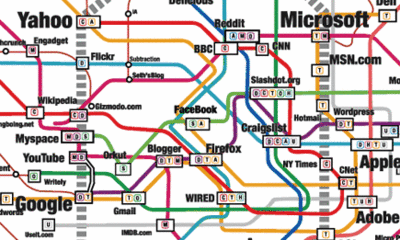
James P. Othmer is a fellow contributor to the high school loser anthology. His debut novel, The Futurist, sits in my to-be-read pile. Below he discusses the enraged reactions of trend forecasters to his fictional portrayal of the profession.
Last summer, Ted Genoways, editor of The Virginia Quarterly Review, which published the first chapter of The Futurist, was approached at a book fair by an actual futurist. She said she had recently discussed my novel, its potential fallout, and damage control strategies at a convention with other futurists. If she were truly good at her job, she would have been able to forecast my eventual hardcover sales and then, realizing the folly of her concern, dismiss the book’s laughable threat with her colleagues at the futurist convention happy hour.
Then there was the TV interview on a Toronto business show about our culture’s obsession with what’s next, for which the producers tried without success to convince a futurist to appear with me. I just wanted to discuss my novel with a wildly inappropriate target audience, not have a cage match with, say, Alvin Toffler, but the futurists feared I would make them look bad.
Apparently that’s what the producers were hoping for, too. When I saw the replay of the interview, the words on the scroll bar read, “Is futurism just a bunch of BS?” Which didn’t exactly help my case.
I have no beef with futurists. Really, I’m very much pro-future. In fact, I distinctly recall having the sensation of kind of looking forward to something the other day (I think it was a nap). And once, that same day, I heard myself thinking, What if…? Shit, I even have a calendar (America’s Ballparks) on my wall that occasionally shows the current month. Which anyone can see makes me a big believer in the future, if not a proponent of all those who claim to be able to foretell it.
Yet futurists keep bugging me. Despite the fact that over the years I’ve met and been impressed by many futurists, despite the fact that I’m a huge fan of the writing of Philip K. Dick, Stanislaw Lem and William Gibson, these futurists write angry emails saying things like, Who are you to tell me that I don’t know what’s really going to happen on the sub-continent in 2012? Or, What makes you think I’m so wrong about predicting that sports cars with prescription lens windshields will be the next big thing for aging baby boomers? And, Who are you to write a book (let alone a novel) that renounces my very high-paying yet hard-to-define profession?
I think one reason futurists are upset with me is that my eponymous protagonist is a plagiarizing, lying, self-absorbed, borderline alcoholic fraud. But really, does this mean that all futurists are, too? I mean, just because Rabbit Angstrom is a sleazy car salesman, are all car salespeople sleazy? Okay, but still…
Another theory is that these angry prognosticators simply haven’t read the book. The fact that the number of angry futurist emails (587) exceeds actual book sales (563*) reinforces this hypothesis. Then again, if they had read the book there’s a strong chance that they’d still be pissed.
But it’s not all bad between me and the present day Oracles at Delphi. Faith Popcorn, whose fictional self appears without her permission in my novel, recently called me to tell me that she had read it and “fell out of bed I was laughing so hard.” Which I took as a very good sign, and not just because she didn’t call to say she was suing me. It doesn’t hurt that Ms. Popcorn’s character, who gets to call my protagonist “a sham and an asshole,” is described in the book as “the mother of all legitimate futurists,” which (attorneys, take note) I totally, truly think she is.
So what do I really think of futurists generally? Well, in former jobs, prior to dedicating my life to checking my Amazon sales ranking, I was fortunate enough to meet many brilliant and interesting people, from Nobel prize-winning inventors, to the head of the MIT Media Lab, Nicholas Negroponte, from Laurie Anderson and Kurt Vonnegut to Watts Wacker, George Gilder, Stuart Brand, the founders of Wired magazine and Carrot Top. Many of them were futurists, and the best were able to interpret trends, data, memes — whatever — and formulate brilliant behavioral insights as well as speculate about what it all might mean for individuals, societies, governments and the planet.
Over the years I also was subjected to the smoke-and-mirrors shtick of some complete assholes who postulate rather than speculate. Who speak in absolutes and well-rehearsed aphorisms. Some sounded interesting the first time I saw them in a meeting, or at a conference. Then, by the fifth time I heard them saying their catch phrase while bringing up (insert most innovative ad brand of the moment’s) work (which makes them cool by association, even though they had nothing to do with it), I was not so impressed. This is all expressed in my protagonist’s
supposedly careeer-ending speech.
So, despite the fact that there are countless futurists of tremendous merit, in my research I chose to focus upon the bullshitters, plagiarists, and phonies of the trade. The ones who speak in sound bites and tell people what they want to hear (or fear). I created a futurist of no merit because I thought that opened up the most provocative possibilities for absurdity, moral tension and situational humor. I thought the notion of such a man — a grossly under-qualified, emotionally unstable man — charged with making sense of the world at this particular moment, let alone five minutes from now, was fascinating.
Besides, who wants to read about someone who’s good at what he or she does?
Trend map image at the top of this post swiped from Information Architects.